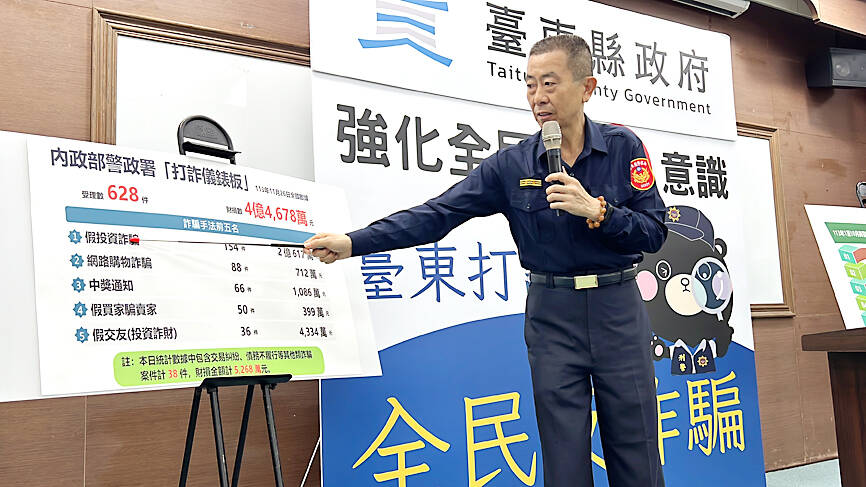New guidelines to combat scams would facilitate coordination across ministries, with the goal of stopping up to NT$10 billion (US$307.49 million) in scams and about 60,000 fraudulent ads from being posted annually, the Executive Yuan said yesterday.
The new guidelines follow amendments to the Fraud Crime Hazard Prevention Act (詐欺犯罪危害防制條例), Code of Criminal Procedure (刑事訴訟法), Communication Security and Surveillance Act (通訊保障及監察法), and Money Laundering Control Act (洗錢防制法)by the legislature in July.
The guidelines hope to increase the public’s ability to spot and prevent scams, and increase penalties for scamming, it said.

Photo: CNA
The Ministry of the Interior said it aims to promote awareness of the rule of law among people of different age groups through 500 events and 140 million text messages, targeting an audience of 50 million annually to prevent scams.
Meanwhile, the Ministry of Digital Affairs said it would implement a real-name system for advertisements on the Internet by next month, and has talked with Google, Line and Meta about such systems.
Google and Line said they would implement the system, and Meta “pledged” to introduce it, the digital ministry said.
Efforts to prevent malicious software from taking users to scam-related sites hope to block 30,000 domains, it said, adding that it is working with Apple to set limits on online transactions.
The digital ministry said it is also working to establish a third-party virtual bank payment inquiry system to mitigate scam losses.
The National Communications Commission (NCC) issued a report saying that it is considering establishing a database to verify user identity and restrict high-risk users from applying for telecommunication services.
The NCC said it has a list of 2.21 million SIM cards purchased overseas, but it has only gone through 100,000 numbers, so it vowed to step up efforts next month to look through the remaining 2.1 million.
The Financial Supervisory Commission said it is pushing measures to ask credit card issuers to increase their monitoring of credit card transactions to prevent fraud.
Its credit card fraud prevention reporting platform hopes to share information with banks and institutions that issue credit cards to mitigate risk, it added.
The Ministry of Justice said it is increasing the rate of confiscating illegal proceeds by 3 percent per year and is working closely with international partners to reduce overseas crime and crack down on cross-border scams.

WANG RELEASED: A police investigation showed that an organized crime group allegedly taught their clients how to pretend to be sick during medical exams Actor Darren Wang (王大陸) and 11 others were released on bail yesterday, after being questioned for allegedly dodging compulsory military service or forging documents to help others avoid serving. Wang, 33, was catapulted into stardom for his role in the coming-of-age film Our Times (我的少女時代). Lately, he has been focusing on developing his entertainment career in China. The New Taipei District Prosecutors’ Office last month began investigating an organized crime group that is allegedly helping men dodge compulsory military service using falsified documents. Police in New Taipei City Yonghe Precinct at the end of last month arrested the main suspect,

A cat named Mikan (蜜柑) has brought in revenue of more than NT$10 million (US$305,390) for the Kaohsiung MRT last year. Mikan, born on April 4, 2020, was a stray cat before being adopted by personnel of Kaohsiung MRT’s Ciaotou Sugar Refinery Station. Mikan was named after a Japanese term for mandarin orange due to his color and because he looks like an orange when curled up. He was named “station master” of Ciaotou Sugar Refinery Station in September 2020, and has since become famous. With Kaohsiung MRT’s branding, along with the release of a set of cultural and creative products, station master Mikan

RISING TOURISM: A survey showed that tourist visits increased by 35 percent last year, while newly created attractions contributed almost half of the growth Changhua County’s Lukang Old Street (鹿港老街) and its surrounding historical area clinched first place among Taiwan’s most successful tourist attractions last year, while no location in eastern Taiwan achieved a spot in the top 20 list, the Tourism Administration said. The listing was created by the Tourism Administration’s Forward-looking Tourism Policy Research office. Last year, the Lukang Old Street and its surrounding area had 17.3 million visitors, more than the 16 million visitors for the Wenhua Road Night Market (文化路夜市) in Chiayi City and 14.5 million visitors at Tainan’s Anping (安平) historical area, it said. The Taipei 101 skyscraper and its environs —

Taiwan on Friday said a New Zealand hamburger restaurant has apologized for a racist remark to a Taiwanese customer after reports that it had first apologized to China sparked outrage in Taiwan. An image posted on Threads by a Taiwanese who ate at Fergburger in Queenstown showed that their receipt dated Sunday last week included the words “Ching Chang,” a racial slur. The Chinese Consulate-General in Christchurch in a statement on Thursday said it had received and accepted an apology from the restaurant over the incident. The comment triggered an online furor among Taiwanese who saw it as an insult to the